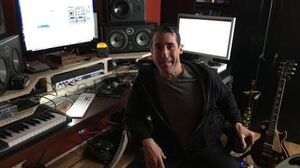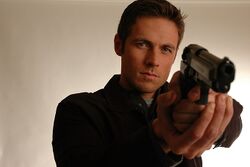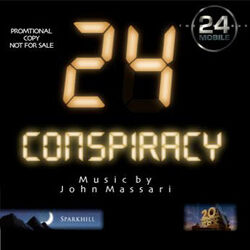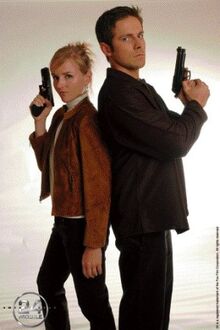- Interview by Thief12 (Carlo Giovannetti)
John Massari is an American film composer who was in charge of the score for 24: Conspiracy, a companion series to 24 released for mobile phones. Massari became interested in film music from a very young age, which eventually led him into a prolific career as a composer, orchestrator, and sound designer in Hollywood.
After working on numerous TV series and films, including cult classic Killer Klowns from Outer Space, Massari was commissioned to compose the score for 24: Conspiracy. Although intended for mobile phones, he approached the score "as if it was gonna be broadcast on television or it was gonna be in a theater". Wiki 24 interviewed Massari to know about his life and career, his road to Hollywood, his musical interests, and future projects.
The following session of questions and answers was sent via email. The audio interview was recorded by Massari himself and hosted by Julie Cummings. The interview was posted on July 4, 2016.

Wiki 24 Interview John Massari
Wiki 24: I've read that as a young boy, classic music scores from the films Journey to the Center of the Earth, Mysterious Island, and The Time Machine inspired you to become a composer. Can you bring us back to that time in your life?
John Massari: Ok, there I was one summer, I believe I was 7 years old. The local theater had a triple feature. I remember going to that movie theater completely in awe. Once lights went out, I was completely mesmerized. I was gawking in amazement the entire time. I didn't really know what was making me do that. I was getting sensory overload, basically from everything, the visual stories... I ended up reading The Time Machine by H.G. Wells, Journey to the Center of the Earth, in addition to Mysterious Island.
Now, after the triple feature was over, I went home, and it was still like living the experience. It made a very, very strong impression on me. I remember at the time, my mom just bought a piano. You could not get me off that piano. There was something about the movie that affected me, and of course, it was music. It was obvious. So there I was, banging in the piano, trying to recreate what I heard. I was gonna be able to watch the movies again, remember what I heard, and possibly recreate it on the piano, cause I'd discovered what a chord was. So it was basically playing it by ear.
I always became fascinated, as any kid, with fantasy and sci-fi. But more so from the musical aspect of how the music translated what you saw on screen, and then how it made the movie really come alive. I loved the music of Bernard Herrmann, and of course the music of Russell García. Later, probably when I was 12 or 13, with my allowance money, I was able to buy my first records. As you can imagine, the first thing I did was buy The Time Machine, Journey to the Center of the Earth, and Mysterious Island; and I must have listened to them so often they were basically unlistenable. That made a huge impression on me. It was until much later, I'd say when I was 12 or 13, where I realized what music did to me in those movies, the impact that the music in those movies had on me, I wanna be able to recreate that. Not every kid in the world says they want to become a film composer - I was 12 or 13 - some people don't even know what that is, especially at the time that I grew up. That's the impact that those films had. I was very happy. It was very fortuitous that I got to see those particular three films.
W24: According to Wikipedia, you played in student orchestras and rock bands, which could be seen as opposites in terms of music style and discipline.[1] What styles of music were you initially attracted to?
JM: Yes, student orchestras and rock bands are opposites. And you know what? Opposites are good. I love classical music very much, I love rock music very much, I love all types of contemporary and alternative music very much, I love film music very much. It's all music. It still conveys great emotion, and to be in an orchestra with very good musicians... At the time, I was a relatively good trumpet player. I played trumpet, I played the contrabass, played the French horn; sometimes I played what's called the tender horn, or euphonium. In the marching band, I played the bass drum. Sometimes I played timpani and tender drum. And in jazz bands, I played the piano. I also played in many bands where I played electric piano and various keyboards. As a matter of fact, one band I actually had an accordion that I hooked up to an amplifier. For some reason, the accordion wasn't a big deal when I was growing up. It was a cause to get your ass kicked *laughs* even if it's pumped through a Vox Sovereign amp. I played bass, I had a Fender precision. And I liked it all!
I mean, in my rock band we played KISS, we played Mott the Hoople, we played David Bowie, Deep Purple, we played Black Sabbath. We played all that stuff and I loved it. Used to wear ear plugs, or course, cause I knew I needed my ears to be working for me throughout my life. I loved R&B, at the time it was called soul music. I loved Isaac Hayes, I loved Billy Preston. I used to listen to their albums all the time; I wish I could play like Billy Preston. Loved Burt Bacharach. Kids used to tease me about it, but I just loved what he does. Frank Zappa had me sold from the second I heard it. It was just so wild and experimental, but yet accessible... accessible to me. I got to appreciate him as a person, his philosophy of being a creative force, a man of great integrity, couldn't have a better role model. Having a variety of music that you expose yourself to, and perform especially if you wanna make that your business in life, that's very important.
W24: Can you tell me about the first musical instrument you learned to play? and what do you play today?

Martin Kail, lead character of 24: Conspiracy
JM: That's a very good question *chuckles* Like I said, the very first instrument was a ruler with some rubber bands stretched across it *laughs* and I played the Beatles songs on the radio. That was my first instrument, then I moved on to piano. Picked up the bass, the contrabass, and the electric bass. Also played a variety of keyboards. I had a Wurlitzer electric piano. I used to get a lot of sounds out of my Wurlitzer with all my guitar pedals. I picked up the trumpet around 14. I played the trumpet until I was like 22; played it into college. Of course, piano, although I'm not really a pianist. I admire my composer brethren, especially Bear McCreary, who performs live in concert, God bless him! That must be so much fun, to be able to do that!
What I play now is a multi-core, hot-rodded Macintosh *chuckles* That's where I create all my music. And from time to time I still play bass. Sometimes I play drums. I have various percussion instruments. I love playing bass, although today I play a really cool riff, I save that, and I take all my cool riffs, and edit them together, and it sounds like a great bass part. But I would not lend myself out as a session player, let's put it that way. I remember hearing something that [multi-instrumentalist and composer] Junkie XL says, he says that about his guitar playing, he's really good at playing fragments and then in ProTools, he makes it all happen. And hey, there's nothing wrong with that. The finished product is what's key.
W24: You started working in Hollywood as an orchestrator. What were some of the challenges starting in the film and TV industry?
JM: Good question. Challenges, that's an understatement. I was still studying music at UCLA, and studying privately with a gentleman by the name of Dr. Albert Harris. Also studied at UCLA with film composer David Raksin, who was a very famous Academy Award winning composer. There wasn't really a film composing program at UCLA. They had kind of just a lecture series basically. My real film education came from Dr. Albert Harris, who was actively working in the industry at the time. I learned a great deal from him. Probably for two years straight I studied with him, on my last year of college and then when I was out of college.
But while I was in college, I think I was in my last year, I was aggressively trying to get to work as an orchestrator with other composers. I was able to get the composer Jerry Fielding and David Rose to return my phone calls. My teacher Dr. Albert Harris was well known in the industry, very well respected. He would basically tell me "You're at a point where you should start working with guys that are really established. Here is the number of David Rose, here is the number of Jerry Fielding. Tell them that I told you to look them up". Jerry Fielding I worked for about a year and a half before he passed away, he passed away far too soon. David Rose, I worked for about two years on a TV series called Little House on the Prairie! I just did little tiny cues, little tiny things, 15 seconds, a little 5 second stinger, anything! I was so happy to work with them.
Needless to say, I caught the bug. I realized that I'm going to have to find people about my own age, that are up and coming, that are filmmakers. So that was the big challenge after you work with established people that they have all their established clientele, so to speak. I needed someone basically in my same set of circumstances, that are working their way up. So I managed to strike relationships with a variety of filmmakers, which I think leads into your next question.
W24: Killer Klowns from Outer Space was one of your first composing assignments. I saw an interview on YouTube where you speak with great passion about it.[2] How would you describe the experience of working in that film?
JM: It was the first film I felt brought me back to that time when I was 7 years old and looking at the triple feature, and wanting to do that kind of music again. I was able to do that kind of music that I saw in Journey to the Center of the Earth, and The Time Machine, and Mysterious Island. I was able to do that in Killer Klowns from Outer Space! And I was in great company because the Chiodo Brothers spoke that language. They grew up on those films, monster films, sci-fi.
And yes, I speak very passionately about Killer Klowns from Outer Space because it was like the perfect storm creatively. Getting to work with the Chiodo Brothers on something completely different. There wasn't a movie like it at all. Well, you could probably say, because around that time Tim Burton came out with Beetlejuice. Which was a quirky sci-fi, horror genre – actually that wasn't sci-fi – it was a quirky horror genre that people were attracted to. And I saw this as a similar direction, or a similar genre so to speak. I just put my all into it from the composing standpoint. And there are plans to record it in a much different way. Stay tuned for that.
W24: People love the sci-fi genre, which is why Killer Klowns became a beloved cult classic. However, a lot of people don't seem to tune in to the sci-fi genre. As someone who was instrumental in the branding of Killer Klowns, what would you say to both groups of people?
JM: I would say "learn to get along" *laughs* Not everyone's gonna love everything. I realize there are people that are into the comic book genre, superheroes, and what have you. Some people are into deep science fiction, things that are very technical, very deep, not very accessible, so to speak. For instance, 2001: A Space Odyssey. I love it, I get it, I read all the books. There are some people that would come away from the books and all of this movies with nothing.
Killer Klowns is sci-fi, Killer Klowns is also horror, Killer Klowns is also comedy! Killer Klowns can be kind of gross. Clowns are not for everyone, but for the people who don't really like clowns or are scared of them, this is a movie where you can overcome your fear of clowns, and you can laugh at them, and you can also run away from them. Over the years, the success is due entirely to the wonderful fans all over the world that have discovered that movie.
What made working on Killer Klowns a very gratifying, creative experience is working with the Chiodo Brothers, who the three together are very strong artistic entities. And that doesn't happen often. I was very happy to be able to work with Steven, Charlie, and Eddie.
W24: How did you come to work in Fox's 24: Conspiracy mini-series?

"I was very grateful to be commissioned to compose the score."
JM: Well, it came to me, which I'm very grateful for. I was working with my friend Eric Young, who introduced me to the Chiodo Brothers years earlier. He started his own company, Sparkhill Productions. Sparkhill produced primarily bonus features for DVDs. 20th Century Fox approached Sparkhill Productions with the notion that they would take their premier shows: 24, Bones, Prison Break, and they were gonna do companion series for alternative media, in this case cell phone and Internet. Since I was their in-house music director, composer, post-production sound supervisor, I was very grateful to be commissioned to compose the score.
W24: Where you a fan of the 24 TV series?
JM: I did watch episodes of it, prior to being offered to work on this companion series. I wasn't a fan in the respect that I would follow all the actors, and follow all the storylines very closely. I did admire and appreciated the whole concept that each show takes place over the course of an actual hour. It was very fascinating to me.
W24: Considering the popularity of Sean Callery's music, how did you approach your score for 24: Conspiracy?

"Getting the overall color and feel of the series was very important, and at the same time, I wanted to give it my personality."
JM: That's a very good question and that's a very legitimate professional challenge, because when I was commissioned to do the series they asked me "Are you able to copy his sound?" and I said "Yes, I can copy his sound. However, do you want me to copy his sound?" "We're glad you said that because we want you to sound like him, but we don't want you to sound like him." I hope that makes sense *chuckles*
I sat down and I listened to a couple of soundtrack albums from the TV series in my car, not near a piano or anything, just to get the syntax, get the vocabulary, get the colors that he was going for. Then I didn't listen to anything, I didn't even watch the TV series while I was working on my TV series. I just let that sink in. I didn't want to, like, start copying any motifs or any themes or anything. But getting the overall color and feel of the series was very important, and at the same time, I wanted to give it my personality.
W24: I'm wondering if you used any special equipment or instruments to create the score?
JM: Yes, I did, as a matter of fact. I took it upon myself to set aside a significant amount of time; and I do this with every project, where I collect unique sounding instruments, unique sounding textures, and I have that sort of as my palette. For this particular series I really wanted to get a variety of mallet instruments that are bowed, that are played with a big contrabass bow.
So if you can imagine, you have a marimba, or a vibraphone. Now imagine these instruments now played with a bow, like a violinist would play. Or a contrabass. The reason I used a contrabass bow is cause it's very big and heavy duty. That's what I used for some of my sustained sounds. And I would do various processing with them, so it's not always sounding the same. So I may play that sound backwards, I may equalize it in such way where is very thin. When someone listens to it, especially another composer, they'll try to and figure out "what in the world was that?"
So those were some of the instruments. There was also Japanese bowls, which is a metallic bowl that's played with a bow, or it can be struck with a wooden hammer or a metal hammer. So I hope that answers your question.
W24: So if we consider then that the exhibition format for this brand new TV series was quite unique, did you find creating the score particularly challenging or difficult in any way?

"I treated this particular score as if it was gonna be on television or the big screen."
JM: We did a seminar for broadcasters from NHK Tokyo, and one of the things they were concerned about with this format, from a visual standpoint "are you gonna light things differently? Are people gonna act differently?" With what I do "Am I gonna approach the sound differently? Am I gonna write different kinds of music? Should I be worried it's coming out of a tiny little speaker?" My response to that is that no, because I believe that you can see an epic, gorgeous, huge, cinematic film on your cell phone, and it's still gonna be an epic, gorgeous, cinematic film. It's the story that makes the breadth of the film come through.
I wrote it as if it was gonna be broadcast on television or it was gonna be in a theater. Did we make it so that it translates to a cell phone? To ear buds and everything? Yes, of course we did. When you mix and create music you want it to translate to all sorts of media. I treated this particular score as if it was gonna be on television or the big screen.
W24: So of all the scores you've created for film and TV, which one's your favorite?
JM: *chuckles* Which one is my favorite? That's like saying which one of your children do you like better than the other. Creating music is an experience, so maybe there's one piece of music that I may prefer over another, or maybe I rather people hear one score over another. If I had one thing to play, what would it be, right now I couldn't give you that answer.
For me, it's the experience. Many times I would listen to my music and I can remember the experience creating it, I remember the experience recording it, people involved listening to it the first time, and their excitement, whether they liked it or they hated it. Cause, believe it or not, sometimes you do something you think that's absolutely wonderful and no one connects with it. Conversely, there have been times where I thought "No one's gonna like this. No one's gonna get it. I can just see myself rewriting this." I'll play the piece or the piece will work with film, and then I'll be quiet, I will look around the room and then I'll see the head shake. And I go "Oh my God, I'm done" And they're not shaking no, they're shaking like "Oh my goodness, I love it" *laughs* So those are the things I cherish.
W24: What music do you personally prefer? And what artists or bands are you currently listening to?
JM: As far as composers, in classical music, I really like Steven Mackie. Film composers that do what I do, there's a number of guys that I admire. When I went to UCLA, Jamie Horner was there, and he was just starting out doing student films, and I've always followed his career and I'm always amazed to see him grow and how we approach different scores. I love the music of Bear McCreary. I feel he's kind of reawakened the appreciation for film composers. Whereas before people weren't aware what the film composer was all about, Bear has been very instrumental in bringing that out. I like the work that Henry Jackman and Dominic Lewis are doing in The Man in the High Castle TV series, and Nathan Barr with The Americans. Incredible music! Transparent, perfect, really conveys an emotion.
As far as bands go, I'm very loyal to my local community. The Offspring, from Huntington Beach. Linkin Park, and The Dickies. I really love the energy of punk rock. The Offspring has a lot of that influence, hard rock almost like heavy metal, but yet punk. I *laughs* also like K-Pop bands. 2NE1, I can listen to them all day! I can't watch their videos cause it's distracting. As far as country music goes, I love the Bakersfield sound. I love the old classic Chet Atkins and Buck Owens. It's not for everyone, it's something that I like. I'm not saying that you guys should like it, I like it. I love Frank Zappa, to listen to him, and I miss him. Ready for your next question.
W24: Are you working on any new projects, and can we look forward to hearing or seeing you any time soon?
JM: Ok, so you gonna allow me to do some plugs. Yes, I am working on some new projects. I have just finished a documentary titled Crows of the Desert: A Hero's Journey through the Armenian Genocide. Awesome, powerful documentary about an individual, Levon Yotnakhparian. Through his actions today there are hundreds of thousands of people, if not millions of people that are alive. That is a project that I have been involved with for the past two years that I'm very proud of.
The other project has to do with Killer Klowns from Outer Space, but I really can't talk a lot about it. I will say that I'm looking very forward to working on it, and I work on it every day! There is also a project I'm working on called Cinematic Steampunk with Margaret Maria. She's a musician in Canada, and we trade tracks and we create new and interesting music. It's rock, punk with a classic music design. And it's very interesting, and very unique, and I love working on it. The feedback we've been getting has been just awesome!
W24: Lastly, is there any particular musician, composer, or director that you're looking forward to working with?
JM: Oh yes! Yes, indeed. Ok, first you ask about composers, correct? Well, Bear McCreary. I'm actually going to work with him on something, but I can't really say anything about it yet. As far as director, well, actually there's a producer that I wanna work with again. But I think he should direct, because he produces like a director, but he never directs his projects. His name is Alex Barder. Another director I would love to work with is Andrew Davies. Andy Davies and I had crossed paths and worked a little bit together, but I would like to do a full-fledged, full-on feature film with him someday soon. And the producer I'm also dying to work with again that I used to work with quite a bit early on his career, that was Mike Paseornek! it's a great filmmaker, perhaps we'll hook up again.
W24: Thank you, John! I'm so happy we had this time together.
JM: My pleasure!
References[]
- ↑ John Massari at Wikipedia. Wikipedia. Retrieved on May 1, 2016.
- ↑ Komposing Klowns. YouTube. Retrieved on May 1, 2016.
| ||||||||
